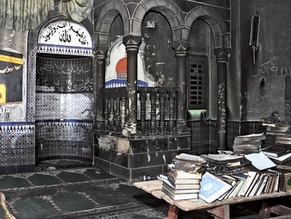|
World Jewish News

The burned-out mosque in Tuba-Zangaria, Upper Galilee. Photo by: Gil Eliyahu
|
Police brace for Israeli Arab revenge attacks following mosque torching
04.10.2011, Israel Police are bracing themselves for possible revenge attacks by Arabs following the torching of a mosque yesterday in the Upper Galilee village of Tuba-Zangaria, an apparent "price tag" action by Jewish extremists.
Police are concerned that Arabs revenge attacks, or acts of Jewish terror, could spark agitation and violence during the upcoming holidays, particularly in cities with mixed Jewish-Arab populations.
Northern District commander Maj. Gen. Ronni Atiya said that several suspects had been arrested, though he refused to say how many or to further identify them. At police request, the Nazareth Magistrate's Court Monday issued a gag order on details of the investigation.
The mosque was attacked at about 2:30 Monday morning in the Bedouin town of some 5,500 people, two kilometers east of Rosh Pina. The mosque's interior was seriously damaged, and many holy books were destroyed by the blaze.
"Price tag" attacks are revenge actions by Jewish extremists, usually against Palestinians, following terror attacks or state demolitions in settlements or outposts.
This time, in addition to spray-painting the words "price tag" and "revenge" on the mosque, the attackers also painted the word "Palmer," presumably a reference to Asher Palmer and his infant son, who were killed on September 23 when stones were thrown at their car near Kiryat Arba, causing it to crash.
Sephardic Chief Rabbi Shlomo Amar condemned the mosque attack Monday, and initiated a solidarity visit to the town, which he made with President Shimon Peres and Ashkenazi Chief Rabbi Yona Metzger.
In media interviews, however, Amar did not discount the possibility that the attack was a provocation carried out as a "blood libel" by someone "who wanted to slander the people considered suspects in this act" and "increase hatred between Jews and Arabs."
Public Security Minister Yitzhak Aharonovitch, during his visit to the town, said he was optimistic the perpetrators would be caught.
"Now it's up to all of us," he said. "We must act with restraint ... and not let extremists cause disturbances."
Police Commissioner Yohanan Danino met with the top police brass Mondayand stressed that incidents like the mosque-burning could set off violence in the Arab community. Police sources recalled the disturbances that occurred in Acre in 2008, when an Arab deliberately drove his car through a Jewish neighborhood during the Yom Kippur fast, which led to confrontations between Arab and Jewish residents during the holiest day on the Jewish calendar.
Sources at the meeting said a decision was made to map out possible confrontation zones in such cities as Acre, Ramle, Lod and Jaffa, and to immediately respond to any incident that could incite either community to disturb the peace.
Danino also told Operations Branch Commander Maj. Gen. Nissim Mor to boost patrols around mosques and other holy places throughout the country, in an effort to assure that Arab community that the police do not take such incidents lightly.
Every police district was told to try to initiate contacts with leaders in the Arab communities under their jurisdiction, to enlist their cooperation in maintaining calm and quelling extreme responses.
Recently, Danino set up a special investigation team within the Lahav 433 division with the sole task of battling "price tag" attacks.
On the eve of Rosh Hashana, three youths, all minors, were arrested on suspicion they had planned to carry out such an attack. They were caught with flammable liquids, spray paint, wire cutters and other implements that could be used for breaking and entering.
The mosque-burning in Tuba-Zangaria once again raised serious questions for the residents about coexistence with their Jewish neighbors.
Some 300 people marched yesterday morning from the mosque toward the Rosh Pina junction, intending to block the main roads in the area. Police said that when they were confronted by policemen dispatched to stop them, the residents threw stones at police. Police then dispersed them with stun grenades and tear gas.
"How come when Jews block roads nobody shoots at them?" asked Kifah Hayeb, a resident of the town. "They burned our holy books, we are heartbroken. All we wanted to do was demonstrate on the road so that people would know what happened to us."
Life in Tuba-Zangaria could be described as complicated. Not only is it surrounded by nearly 50 Jewish towns, it has an appointed Jewish council head, Zvika Fogel.
"As a result of living in such a reality, [the residents] are living in a pressure cooker, having been placed in a Jewish environment that doesn't always accept the village as self-understood," said Fogel. "When an incident like this occurs, it incites the passions of those who are pained by other things on a daily basis."
Fogel was appointed by the Interior Minister three years ago to take over the running of the town after the local council failed, and has himself been a target of hostility. Just hours before Yom Kippur two years ago, his car was set on fire and he was shot at with an automatic weapon while in his office.
Incidents like yesterday's, Fogel said, "set off the extremists, and we see where it leads. We don't understand who would want to drag the community into this whirlpool."
Tuba-Zangaria's unusual situation has, since the state was founded, forced the village to prove and reprove its loyalty. During nearly every visit to the home of Hussein el-Hayeb, the previous local council head, he will suggest visitors leaf through a book that tells the story of the Bedouin unit that fought with the Palmah during the War of Independence.
The town's declarations of loyalty don't always pay off. Six years ago, residents were angered when neighboring Hatzor Haglilit was included in a government list of peripheral towns eligible for tax benefits, while their town was left out.
Yair Ettinger contributed to this report.
Haaretz.com
|
|
